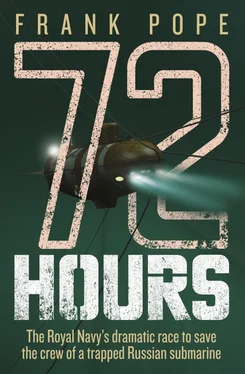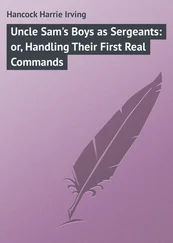Half an hour later, while still waiting for the USAF C5 to clear customs, the clouds opened once more to reveal another transporter. This time it was a C17 like the RAF’s, looking like a toy compared to the bulk of the C5. The British team all watched with interest where it would be directed to park. It ended up on the same taxiway, but about a mile closer to the terminal buildings. The thinking was baffling. The aircraft was nearer to the British aircraft than their US counterparts in the C5.
It was a full two hours after the C5 had landed that Riches finally managed to persuade the Russian officers guarding them to take him to the American aircraft. With the northern sun finally set and darkness fallen, he walked up the stairs to the cavernous belly of the C5. He’d been preparing his arguments carefully, but after all this waiting he was sure that the US team would be reluctant to allow another delay to their own operation. To his relief the first person he met was Van Horn, but he’d forgotten how huge the American was. He felt like a Jack Russell facing a bull mastiff.
Riches tried to smile casually as Van Horn’s shook his hand in a bone crushing grip. He launched straight in. ‘Kent, we’ve got a problem,’ he said. ‘The Russians promised us they’d have a K-loader here for us. They don’t, and we’re stuck. We’ve already prepped our VOO [Vessel of Opportunity] and we’re all clear to go, but we just need to get our gear off. We’ve only got our single Scorpio and its kit, that’s it – your stuff will take twice as long to unload.’
Riches reminded himself to slow down. His words were coming out in a torrent, having been bottled up for two hours.
‘I need to borrow your K-loader. Half an hour is all I need. The C17 with your K-loader is parked closer to us than you. It can make the trip up towards us and be back with you in no time. We’ll get out to the incident site a few hours ahead. As you know, that might be the difference between life and death. What do you think?’
Van Horn’s eyes narrowed as he thought about it. He’d brought along almost 40 people, partly in order to allow him to split his team into three sections who could all work on separate tasks at the same time. But his carefully choreographed plan was already stumbling over Russian inefficiencies and lack of equipment. There weren’t enough trucks to be able to transport their kit down to the docks in parallel with the British – everything had to be done in serial fashion, one after another. The Brits were well ahead with preparing their ship, and it was certainly true that the UK’s single Scorpio was going to be quicker to shift. Besides, he hadn’t even seen his ship yet.
But there was an important factor that was missing.
‘How are weather conditions on site, Ian?’
‘All our reports are that they are holding. It’s looking as good as it gets right now,’ Riches replied.
‘And projections for the next twenty-four hours?’
‘We’re still working on that,’ he said. The low pressure system that had hung over the airport was intensifying, but as yet there was no evidence that things would change out in the bay.
Van Horn nodded. Part of the reason that the US system was so much bulkier than the UK’s was that they had come with a much more heavyweight deployment system. The single Effer crane that the UK had brought to lift Scorpio in and out of the water would quickly be overwhelmed by bad weather. When recovering the ROV in a strong swell, the one-and-a-quarter tonne machine would be supported by a wave one second and left hanging in the air the next. The resulting ‘snatching’ created huge dynamic loads that had the potential to tear the lightweight crane apart and leave them without a way to bring the machine back on board.
The US Deep Submergence Unit had brought along a purpose-built mini-A-frame that was strong enough to deploy their larger Super-Scorpios (at 3.5 tonnes more than twice the weight of Scorpio) in conditions up to Sea State 4, with swells of up to two metres. If bad weather was going to be a factor then this could make the crucial difference, allowing them to launch successfully.
A few seconds later Van Horn nodded. ‘Okay,’ he said. ‘If the sea’s looking good the right answer is that you take the K-loader first. But listen, we’ve got to run this past the Commodore first.’
Riches’ heart sank. They’d brought along a Commodore. This was presumably to have sufficient authority to match any high-ranking Russian officers – a Commodore was equivalent to a senior Russian Captain or even a junior Admiral. Like a game of chess, if a diplomatic situation arose you needed to be able to match powerful pieces with powerful pieces. The military hierarchy is persistent, and even if two nations are at war the relative superiority of ranks are mostly respected. But if the US had brought a Commodore without a detailed knowledge of submarine rescue he might not realise the benefits of letting the UK use the K-loader first, or even put political interests ahead of practical importance.
Their fears were unfounded, and Commodore Mike McLaughlin of the San Diego Submarine Squadron immediately agreed. Riches breathed a sigh of relief. The UK team had cheered in the aircraft when they had heard they would land ahead of the US team, but that competitive spirit had now evaporated. They knew very well from exercises that cooperation was the key element in submarine rescue, but real-life operations could sometimes play out differently. Now it was clear to Riches that this was not a race between the various submarine rescue services, but a race against time. And, so far, it was time that had the edge.
Fifteen minutes later, a low rumbling grew from the darkness in the direction of the terminal buildings. The noise got louder and louder, until finally the American K-loader appeared with a forklift trundling along by its side.
Just forty minutes later, all the UK equipment had been rolled out of the back of the C17, on to the K-loader and then loaded on to the waiting flatbed trucks with the Russian crane. While some of the trucks had the standard twistlocks to secure shipping containers at their corners, most of the gear had to be lashed down with ropes and chains.
Riches stared in disbelief when he saw a couple of police cars pull up. The last thing they needed was another level of authority to hold them up now that they were finally ready to get the equipment down to the docks. But he was mistaken: this was their escort. As soon as two of the team had hopped into one of the truck’s cabs, the whole convoy began to roll.
Gold was watching the convoy as it disappeared into the distance, looking unhappy. Not for the first time, Riches wondered if Gold’s partner at home ever felt jealous of his devotion to that machine. Little did he know then just how prescient Gold’s concern would turn out to be.
It wasn’t long before a drab, military grey minibus arrived to pick up the rest of the team as well. Finally things were moving, Riches thought. But once he’d slammed the door the driver set off in the wrong direction. They weren’t headed for the gate at all, but back towards the terminal. The driver explained – through the translator – that they had to go and pick up the American team, who had just been given permission to go and inspect their vessel. Riches shook his head in the darkness. Surely the Russians could have allocated more vehicles for an incident that had evidently become a national concern?
It was close to midnight when they finally escaped Elizovo airport. The night was pitch black as they made their way out of the gate and down the wide, smashed roads. The minibus’s suspension was shot, giving the passengers a precise feeling for the state of the road surface beneath them. In contrast, the heating worked extremely well. Within minutes they wished it didn’t, as it was stuck on full blast and everyone was slowly roasting.
Читать дальше












